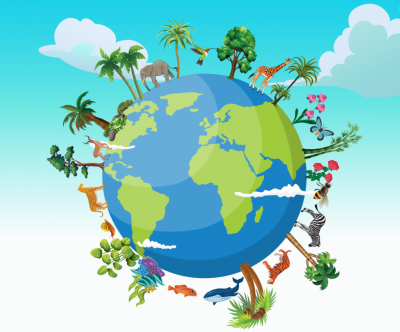
Biodiversity is the name we give to the variety of all life on Earth. Bacteria to baboons, plants to people – the range of life on our planet is incredible.
All living things exist within their own communities, or ecosystems – oceans, forests, deserts, ice caps and even cities. All this put together is biodiversity: the volume of life on Earth as well as how different species interact with each other and with the physical world around them.
The word biodiversity is a contraction of ‘biological diversity’. The concept is broad and complex, but that complexity is what makes Earth a perfect place for humans to live.
Biodiversity and species richness
When we talk about biodiversity, we often talk about species richness as well. Species richness is the number of different species in an area, a way of measuring biodiversity.
Studying species richness helps us to understand the differences between places and areas.
For example, the Amazon rainforest very species-rich as it is home to 10 million species. In contrast, the Sahara Desert is far less rich, with just a few thousand species.
About 1.5 million species have been described by scientists, and most of them are insects. But it is thought that there are millions more sharing our planet with us.
Endangered species and mass extinction
Overall biodiversity loss can speed up extinction. More and more animals and plants are facing an uncertain future.
The International Union for Conservation of Nature (IUCN) is the global authority on the status of the natural world. It keeps a Red List of endangered species, an important indicator of the health of the world’s biodiversity.
Currently, more than 30,000 species are listed as threatened with extinction, which is 27% of all assessed species.
We know that millions of species have already gone extinct over the long history of planet Earth. Biodiversity rates have always ebbed and flowed. In fact, at least 99% of all the organisms that have ever lived are now extinct. Researchers agree that five huge mass extinction events have already happened, including the one that wiped out the dinosaurs 66 million years ago.
However, extinction rates have been accelerating as human populations continue to grow, and many scientists argue we are living through a sixth mass extinction. This time, humans rather than natural events are to blame. Species diversity in more than half of land ecosystems is now critically low.
A 20% drop is widely considered the threshold at which biodiversity’s contribution to ecosystem services is compromised. It’s estimated that over a quarter of Earth’s land surface has already exceeded this.
Causes of biodiversity loss
Biodiversity is in trouble in the UK and across the globe, and its loss can refer to local and worldwide extinctions. Species and ecosystems can be fragile, so small changes can have large consequences.
The causes of biodiversity loss are complicated, but we know the human population is making the problems worse.
In the short time humans have been on the planet we have increasingly disrupted the balance of biodiversity through changing land use, overexploitation of resources and the impact we are having on climate.
We are converting natural habitats into farms, factories, roads and cities. In the ocean, we are overfishing, drilling and mining.
Cities and towns have a smoothing effect on biodiversity, tending to favour generalist species like feral pigeons. Those that require a particular habitat, or are intolerant of disturbance or pollution, often can’t survive. This is called biotic homogenization.
Animals and plants that can only live in one small area of land – like unique butterflies or flowers – can go locally extinct if the city’s conditions are unfavorable to them.
A lichen specimen held in the crypt herbarium at the Museum. All living things, including plants and fungi, are represented by the word ‘biodiversity’.
Credit : Natural history museum
Picture Credit : Google




